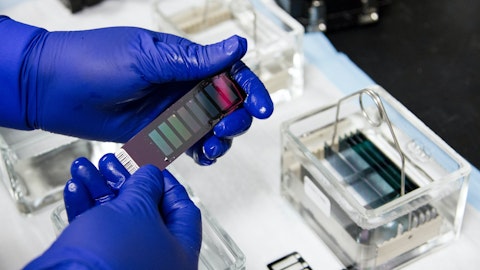Matthew Klein: I think I would say as we highlighted and Professor Muntau highlighted very nicely in our deep dive that how burdensome a restricted Phe diet is for patients. So even slight increases in intake would be an incredible benefit both — and gratifying for physicians, but obviously important for patients in their quality of life. Of course, when looking at our data and we’re seeing that patients are able to get beyond the recommended daily allowance of protein that an unaffected individuals would be able to have as part of their standard diet and still maintain control I think that those are incredibly powerful data because that would far exceed what anyone would even hope for in a therapy. So for us to be able to observe that has been very encouraging to us. Obviously, it’s something that the patients have gotten very excited about. And as Dr. Muntau said herself she and other physicians are very excited about what they’ve seen so far in this data.
Unidentified Analyst: Okay. Great. Thanks for taking the questions
Operator: And thank you. And one more for our next question. And our next question comes from Jeffery Hung from Morgan Stanley.
Michael Riad : This is Michael Riad on for Jeff Hung. Thank you for taking questions and congrats on the quarter and the progress. So if you have favorable US regulatory outcomes in all your late-stage programs presumably we’d see them launch in a close timeframe. So how is the company thinking about preparations for multiple simultaneous launches, especially in the context of the annualized $150 million in OpEx savings in 2024? And would you launch them immediately if that was an option? Thanks so much.
Matthew Klein: Yes. Michael thanks so much for the questions. We would look forward to that opportunity. We have been building for that. We’re well set up for that. We’re well funded for that. I’ll let Kylie provide a little bit more color but let me just say the short answer is we would welcome that activity and work as quickly as possible as we always do to get these important therapies to patients. Kylie do you want to provide just a little more color around this infrastructure?
Kylie O’Keefe: Yeah absolutely. Thanks Matt and thanks Michael for the question. As Matt said I think we’d definitely welcome that problem to have, but as we’ve talked a lot about we have a really strong commercial infrastructure in place globally and this includes both capabilities and capacity to focus on neurology and metabolic. And obviously the team is gearing up very quickly for a potential PKU launch. In addition to that obviously we don’t start on day one of launch. The team has done a lot of work while trials are ongoing to build relationships with KOLs to build relationships with patient advocacy groups to ensure that we understand the need for the payers to ensure that we understand what’s necessary to be successful at launch.
And all of that takes place sometimes often up to two years prior to launch. So we’re in a good position to be ready upon successful regulatory discussions and positive movement towards NDA submission. And it wouldn’t require additional resources or infrastructure to be successful there. So, we have the footprint in more than 50 countries around the world and we are definitely ready to go. And I know I speak to many of the colleagues that we are excited for the opportunity to be able to bring a lot of these differentiated therapies to patients with high unmet medical need in neurology and metabolic spaces.
Michael Riad : All right. Super. That’s really helpful. And then maybe a last one more of a housekeeping question. Could you comment a little bit on the royalty rate for Evrysdi from Roche? It seems like it’s been trending a little bit down in the last few quarters. Any commentary on what we should expect?
Matthew Klein: Sure. Kylie do you want to fill that in?



